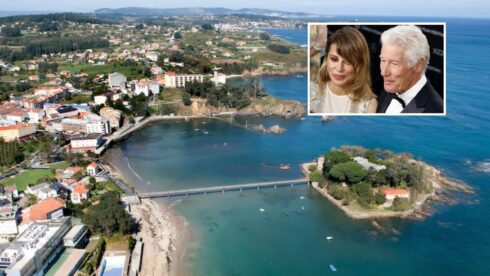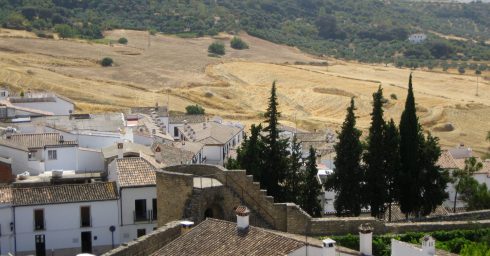By Wendy Williams
IT is, without a doubt, one of Andalucia’s most evocative valleys.
So it is no surprise, that British Prime Minister David Cameron recently told his Spanish counterpart Jose Luis Rodriguez Zapatero that taking holidays in the area was going to be one of the things he would most miss about leading his country.
Despite being a little damp, the UK leader had spent a wonderful week around the Guadiaro valley – dubbed the ‘secret valley’ – in 2008.
He had particular enjoyed the stunning Walk of Mr Henderson’s Railway, which traces the 19th century railway line as it winds up the valley between Jimera de Libar and Benaojan.
Having recently taking my first sojourn around the Guadiaro valley, it is easy to see why Cameron had fallen for the area.
Hidden away in the heart of Andalucía, just south of Ronda, the stunning valley is full of charming villages and some of the country’s best scenery.
Whether you enjoy walking, swimming, bird watching, cycling, hiking, horse riding or just plain relaxing, there is something for everyone.
But what really sets the area apart is the breathtaking scenery that surrounds it, thanks in part to the high rainfall it receives.
While the well known adage may claim that the rain in Spain falls mainly on the plain, actually, the rain in Spain falls mainly in the Grazalema natural park, in which much of the Guadiaro valley sits.
The sleepy villages, though painted white on the outside, are full of colour inside
The high levels of rain – up to 3000 litres a year – account for the lush greenery of the valley that is a stark contrast to the more arid landscape often associated with the sun-drenched South of Spain.
One of the highlights of any trip here is the spectacular drive along the winding roads that often sit hundreds of yards above the river.
At every turn the view seems to get better, particularly as the classic white-washed villages of Cortes, Jimena, Benaojan, Montejaque and Jimera come into sight.
Once inside these sleepy villages it is clear that while they may be painted white on the outside, they are full of colour inside with an amazing historical legacy and local culture.
But, do take note; they have tiny streets built a time long before the advent of cars, so driving can be tricky.

It is best to explore on foot or you could find yourself stuck between two white walls on a one-way street.
Montejaque is one such tiny village, with just 1000 inhabitants it lies in the shadow of the El Hacho mountain peak, on the edge the Grazalema Natural Park.
The name Montejaque comes from the Arabic ‘Monte-Xaquez’ meaning ‘lost mountain’ and the remains of a medieval fortress here point to the town’s once key role in protecting the borders of the Nazari kingdom of Granada.
The neighbouring town of Benaojan, like the majority of these villages, is also of Moorish origins with its narrow streets centred around the main square and church.
Now famed for its chorizo, Benaojan was originally built on the mountainside but has now also grown up around the railway station in nearby Estacion de Benaojan.
This area is also renowned for the caves that are situated just a stones throw away; La Cueva de la Pileta being the most famous.
According to Andy Chapell, owner of the well-established hotel ‘Molino del Santo’ in Estacion de Benaojan, they were not just the first Britons to open a business in the area in 1986… his wife was the first woman to drive.
“What first attracted us here was that it was all so unspoilt,” he explains. “The landscape is amazing with the gentleness of the valley bottom and the dramatic scenery above.
“There are so many varied things to do here with the railway line, the Roman sites and caves. But, in particular we love the people just getting on with their lives,” he adds.
Further down the valley, across from the Líbar mountain range, you will find Jimera de Libar.
When the Arabs settled here the town was called Inz Almaraz meaning “woman’s castle” but this was changed to Ximera de Libar after the Christian conquest.
Nowadays this village is home to a vibrant annual music festival held at the beginning of September.
I had a sort of revelation of being where I belonged while walking one night in the rain
Continuing your journey down the valley you reach the slightly bigger Cortes de la Frontera, with a population of around 4,500.
It is home to one of the largest bullrings in the Serrania de Ronda, built in 1894. And with both the Grazalema and the Alcornocales Natural Parks surrounding it, Cortes is truly spoilt for nature.
For me, what makes these remote villages even more spectacular is that they seem a million miles from anywhere; but in reality they are less than an hour’s drive from the hustle and bustle of the Mediterranean coast.
Suzanna Odell, owner of the charming Hostal el Anon, has lived in Jimena since 1977, and is quick to praise the ideal location of the area and the beauty of the surroundings.
When talking about her arrival in the area she says: “I had had a sort of revelation of being where I belonged while walking one night in the rain. I wanted to live here forever.
“They place a lot of importance on children and the family, which is one of the reasons I like it here, for the humanity. Even the poorest of people, the labourers, know how to behave and are considerate.”
With so much on offer, this hidden gem is a must see for anyone wanting a taste of the real Andalucía.
Rising near Ronda and winding its way down through the mountains to the Mediterranean, the 183km long Rio Guadiaro is quite a short river, but it is home to incredible scenery, not to mention half a dozen of the best white villages that Andalucía is renowned for.
So why will Cameron miss it so much? It’s obvious… it’s just beautiful.







